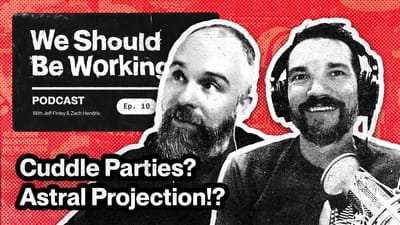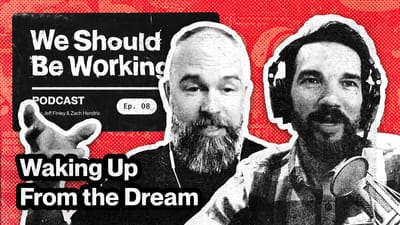How I Went From Agnostic to Spiritual

I picked up the audiobook The Human Mind Owner's Manual: Your Connection to the Universe, Consciousness, and Nonhuman Intelligence by Sean Webb. Sean was actually my first introduction to spirituality back in 2013 with his I AM Spirituality Podcast.
I distinctly remember my aversion to the term spirituality back then. As an agnostic and former Christian, I was weary and skeptical of anything spiritual. But Sean's podcast inspired me to reconsider. What drew me in was his theory on how emotions work. He was a guest on the Smart Passive Income podcast on June 6, 2013 (my 31st birthday).
I appreciated how "logical and rational" he was instead of airy fairy. He developed his own model of the body, mind and spirit as well as his famous equation of emotion.

I wrote about this in my overcoming depression series on my then brand new blog Maker/Mistaker. Here's what I said about Sean:
One of the podcasts that Think Traffic recommended was the Smart Passive Income podcast with Pat Flynn. I had listened to the shows they recommended, but as a new subscriber, a new episode popped up and I started listening while at work. They introduced Sean Webb and he talked about how emotion worked and boy, did it intrigued me.
On June 17, I bought his audiobook How Emotions Work in Humans and Computers. Incredible and mind-blowing. I was able to see exactly how sadness and depression are caused.
This introduced me to the concept of the self. The ego. Let me say that I’ve never thought about it this way before and it all made sense. Sean has a podcast that he calls the I AM Spirituality Podcast. Which at this point looked like nothing I’d be interested in. Yet. I have since subscribed to his podcast and love it.
While you can't find much of that podcast online anymore, he does have a few choice episodes on his current YouTube channel entitled Mind Hacking Happiness. His second episode True Self, False Self gets into the most fundamental question, "who am I?"
True Self, False Self
This was when the seed was planted for my eventual spiritual awakening. At this point I was devouring any and all content I could get on the subject. In fact, thanks to Sean and his "free audiobook" affiliate link to Audible, I became a member and picked up Richard Rohr's audio lecture by the same name, True Self, False Self. I've since enjoyed hundreds of audiobooks over the last decade.
It was because of Sean that I first learned about Eckhart Tolle's The Power of Now, and Lao Tzu's Tao Te Ching. I got much more interested in meditation thanks to Sean, and picked up Mindfulness in Plain English on his recommendation.
Honestly, his podcast was my gateway into the vast world of spirituality. He got me to change my mind on what I thought spirituality was and felt like it was my higher self or God speaking to me in ways I could understand.
While he's gone on to write more books and podcasts, I eventually moved on from his teaching and onto other stuff. He's perfect for beginners or newbies to this material because of his casual logical style and sense of humor.
So I'm enjoying his latest book and revisiting his material a decade later. While I don't know if I agree with everything he says, I still think he's got quite an interesting approach to the mind and how to manage emotions.
If I had any criticisms of him, it's that he sometimes comes off as a bit arrogant and pompous. For someone that has achieved enlightenment, as he claims, he seems to have quite the ego. I remember reading his Mind Hacking Happiness books a few years back and had this thought.
Sean comments on his teaching style on his current website:
When teaching about enlightenment and mastery of the human mind, many teachers exhibit a demeanor of perfect calm, soft spoken wisdom, unassuming humility, and seem to command great separation from human ego. Frankly, that’s just not my style.
It’s not that I don’t have that perfect calm within. I do. It’s not that I can’t draw forth a soft spoken wisdom. I can. It’s not that I have not overcome ego and don’t know that I’m not any more special or important than you are. I have indeed overcome ego, and I do understand that in the end, the entire purpose of my existence is to be here to serve you.
I just figure it’s more effective not to be boring while I try to deliver you this best-in-class training content. My approach to help you level up your mind is based on mixing the most ancient of global wisdom disciplines with the latest cognitive neuroscience discoveries, which helps sharpen the understanding of both. I just elect to also mix in a whole lot of personality quirks when I am speaking in front of a camera, or writing words onto a virtual page. If you can deal with my playful ego, I won’t lead you astray.
— Sean Webb
I highly doubt he has "perfect calm" within. Or that he's "overcome his ego" with such certainty. But to each their own. His style is a welcome change of pace in spiritual-audiobook-land and makes for an entertaining, personal, listen. It's very informal and not so serious on what can be a serious subject.
The other part of Sean that I find a little sus, is that he's always been connected to the military and Silicon Valley tech companies. Taking his understanding of emotion and spirituality and applying it to artificial intelligence so that AI can become more human-like. And his technology can also be used to predict, engineer, and manipulate the emotions of human beings on mass scale.
From his website:
Using his understanding of mind and deep mind, Sean has developed the first ever Algorithms of Human Emotion that are not reliant on biosensors.
These will soon to be used to not only create simulated Turing test passing emotional responses in artificial personalities (think; C-3PO), but they will also be used to help create functional empathy and compassion in computer logic and their applications.
This will not only make computers more user friendly and emotionally intelligent, it may also just save us from a rogue artificial general intelligence from accidentally or intentionally bringing an end to the human race.
Either way, if Sean knows the human mind well enough to help computers understand how our minds work, he can certainly help you learn how to hack yours to your greatest personal benefit.
— Sean Webb
So make of that what you will. Sean starts off his book addressing how he built his algorithms with the best of intentions but became aware of bad actors who want to use it for nefarious purposes. So there's that.
That's about all I've got say on the subject for now. Thanks for reading and have a great weekend!
Talk soon ✌️
Jeff
No spam, no sharing to third party. Only you and me.








Member discussion